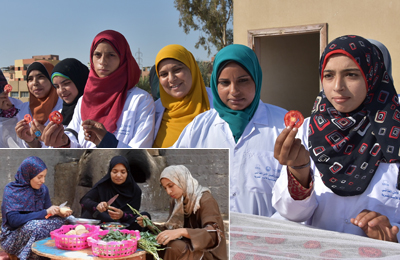The impact of malnutrition on the well-being of children and on both the human and economic capitals at country level are well documented. Malnutrition accounts for 35% of the disease burden in children younger than the age of five Poor early nutrition leads to poor school readiness and performance, resulting in fewer years of schooling and lower quality of learning. Stunting and anemia, on the other hand, lower productivity in physical labor. Stunted children become stunted adults who are 2-6% less productive than adults of normal stature. It is estimated that a 1% decrease in adult stature is associated with a 1.4% decrease in productivity.
In view of the above, the Food and Agriculture Organization of the United Nations (FAO) and the Ministry of Agriculture and Land Reclamation have elaborated a project called “Improving Household Food and Nutrition Security in Egypt by Targeting Women and Youth,” in which nutrition awareness is integrated with food production and income generating activities. It aims at assisting the Government of Egypt to create a food-secure environment in which women and youth have access to sufficient and diversified food of both animal and vegetable sources and have the necessary knowledge and skills in the use of food to consume nutritionally adequate diets. The Project works in five governorates, namely: Assiut, Aswan, Beni Sueif, Fayoum and Souhag.
Objectives
The Project is designed to improve the food and nutrition security of the vulnerable by improving the skills of women and the youth in food production, small animal husbandry, and other entrepreneurial activities, in addition to increasing their level of knowledge about nutrition through education and Behaviour Change Communication Plans.
The Project is centered on three major intervention strategies, namely:
- Nutrition and health behavior through education and Behavior Change Communication.
- Homestead food production and income generating activities.
- Capacity building on participatory approaches for improving household food and nutrition security.
Stakeholders
The Project adopts a multi-sectoral approach and continuously coordinates with stakeholders from the Ministry of Health, Ministry of Education, the Ministry of Agriculture and Land Reclamation in addition to local communities and Non-Governmental Organizations. The integrated approach of the project, i.e. coupling food production with nutrition education so as to enhance a change in nutritional behavior backed up by food secure environments, will be assessed for its impact for further integration in national policies.
Implementing Partners
Agriculture directorate in the five Governorates of intervention; Agriculture Extension and Rural Development Research Institute (AERDRI); CARITAS; Central Administration for Agriculture Extension (CAAE); Coptic Evangelical Organization for Social Services (CEOSS); Egyptian Food Safety Information Center (EFSIC); ElOrman Association; Food Technology Research Institute (FTRI); Food Security Information Center (FSIC); Ministry of Agriculture and Land Reclamation (MALR); Ministry of Local Development (MoLD); Ministry of Social Solidarity (MoSS); Misr El Kheir Foundation (MEK); and National Nutrition Institute, Ministry of Health (MoH).

